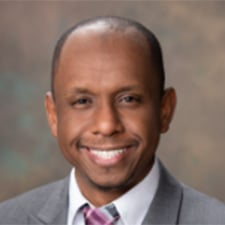As a medical student, do you ever wonder what it’s like to specialize in vascular surgery? Meet Ayman Ahmed, MD, a vascular surgeon and a featured doctor in the AMA’s “Shadow Me” Specialty Series, which offers advice directly from physicians about life in their specialties. Check out his insights to help determine whether a career in vascular surgery might be a good fit for you.
The AMA Specialty Guide simplifies medical students’ specialty selection process, highlights major specialties, details training information, and provides access to related association information. It is produced by FREIDA™, the AMA Residency & Fellowship Database®.
Learn more with the AMA about the medical specialty of vascular surgery.
“Shadowing” Dr. Ayman Ahmed
Specialty: Vascular surgery.
Practice setting: Hospital.
Employment type: Employed by Marshfield Clinic Health System in Marshfield, Wisconsin. Marshfield Clinic Health System is a member of the AMA Health System Program, which provides enterprise solutions to equip leadership, physicians and care teams with resources to help drive the future of medicine.
Years in practice: Five.
A typical day and week in my practice: On surgical days, academic conference with the residents and fellows starts at 7 a.m., then I’m either doing surgeries in the operating room or seeing patients in the angiosuite from 8 a.m. to 4 or 5 p.m. If it is a clinic day, then I will see patients from 8:30 or 9 a.m. to 3 or 3:30 p.m.
A typical week will have a combination of operative days in the main OR, operative days in the angiosuite, clinic days and office-based intervention days for varicose veins.
The most challenging and rewarding aspects of vascular surgery: The most challenging aspect is getting patients’ needs met in terms of outpatient follow-up, as some have social restrictions that can affect their longitudinal care.
The most rewarding aspect is relieving patients’ pain and saving their limbs.
The impact burnout has on vascular surgery: It is significant especially when there is a busy week-long call. But I do have a very supportive group of partners who help me enjoy my job. I don’t experience much burnout.
How Marshfield Clinic Health System is reducing physician burnout: It provides numerous resources that physicians can access if burnout becomes an issue such as DAX Copilot for automated documentation and peer to peer coaching.
How my lifestyle matches, or differs from, what I had envisioned: My job is much like I had imagined in medical school. The proximity of my home to my workplace, the supportiveness of my partners, the flexibility of my time off, the resourcefulness of my hospital and the satisfaction I find in helping patients, combined with staying up to date on new technology and procedures and also teaching new generations gives me a rewarding work life.
Moreover, vascular surgery is a very satisfying specialty because its training is well rounded, from very fine open surgical technique and minimal invasive technique to medical knowledge and radiographic knowledge.
Skills every physician in training should have for vascular surgery but won’t be tested for on the board exam: You should be passionate about patients. You have to consider the patient as a whole, as vascular disease is a systemic disease with many related conditions. Understanding what patients are going through and what they expect from you has a huge impact on their outcomes.
One question physicians in training should ask themselves before pursuing vascular surgery: Do I enjoy lifelong relationships with patients? A vascular patient is always a vascular patient.
Books, podcasts or other resources every medical student interested in vascular surgery should be reading:
- The “Audible Bleeding” podcast.
- Rutherford's Vascular Surgery and Endovascular Therapy, edited by Anton N. Sidawy, MD, and Bruce A. Perler, MD.
- Current Therapy in Vascular and Endovascular Surgery, by James C. Stanley MD, Frank Veith, MD, and Thomas W, Wakefield, MD.
Additional advice I would give to students who are considering vascular surgery: Vascular surgery is in high demand, especially with a growing patient population, both in the U.S. and around the world. There are many patients out there who need a vascular surgeon to help them. It can be a demanding specialty during training, but it is a very rewarding one in many ways.




